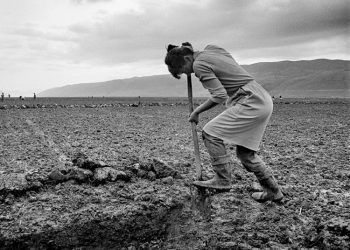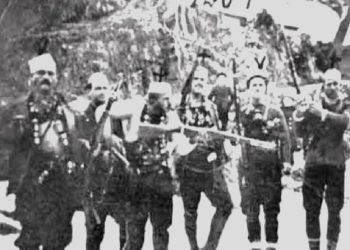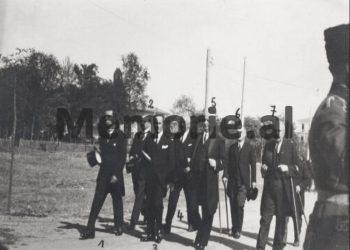Second part
Memorie.al/ publishes a study conducted by AIDSSH (Authority for the Information of Former State Insurance Documents), entitled “DISAPPEARED – INSURANCE IN OWN WORDS”, 19 INSURANCE BRANCH, 3299 JETH, 1 HISTORY’, in which was used the “History of the State Security”, which belongs to a period of time from 1943 to 1991, which includes 19 branches of the State Security, from the districts: Durrës, Kolonje, Burrel, Krujë, Lushnje, Dibër, Gramsh, Pogradec, Korçë, Tepelën, Elbasan, Lezhë, Sarandë, Gjirokastër, Vlorë, Shkodër, Tropoje, Skrapar, Librazhd and Tirana.
Entry
INSURANCE IN OWN WORDS
“Those who think that communist regimes are the work of criminals only, overlook a fundamental truth: criminal regimes were not formed by criminals, but by convinced enthusiasts…”!
Milan Kundera, “The unbearable lightness of being”
Continues from last issue
KOLONJA:
The border region, the history of the State Security in Cologne is one of the “richest” with events, “hostile groups”, “traitors” and “Greek intelligence agents”, who have been pursued for a long time, by more than one co-worker, even on long routes, Erseke-Tirana.
In some cases, “combinations” are used, a term that the Security uses when setting up traps and testing those it considers suspicious. In one case, it is a pack of cigarettes with a Greek inscription that starts the “processing”, the pursuit of the suspects. In other cases, there is evidence that for those who have been secretly arrested, rumors spread that they are studying in Moscow, or have been called to work in Tirana.
Among the testimonies, there is also that of the execution of three young men, in an attempt to escape. Dead in prisons, killed at the border, in some cases are given in the history of the Cologne Security, with the unbearable ease of a success. The large number of events, of fugitives, of those who were declared enemies, who were arrested as Greek or Anglo-American intelligence groups, was also related to the wide border extension of the Cologne area with Greece.
Even in Cologne, as in all of Albania, initially the work of the Directorate of People’s Protection, the precursor of the State Security, was aimed at identifying and eliminating those who were considered “war criminals”, then the object of persecution, they became all those who rejected the “Albanian paradise”. In the years 1949-1955, with all the blows and persecutions that were done to the enemies of power by Sigurimi, the latter admits that about 60 people escaped from the Cologne area to Greece.
30 shootings after the war
In the context of the capture of “war criminals”, sometimes in districts and sometimes in the ranks of the national liberation army, where they had tried to “hide their tracks” and who had carried out the activity in the district of Kolonja, after the war, Sigurimi admits that they were tried and 70 “war criminals” were sentenced, of which 30 were shot, as “criminals”: Veli e Teki Meçe, Dalil e Seit Tare, Qazim Maluka, Izet Sako, Qemal e Emurilla Burimi, Beçe e Lilo Mino, Seit Dosti, Zini Isaj, Ahmet, Ibrahim and Enver Noku, Qani Kaleci, Zenel Xhomaqi, Syrja Kajmaku, Medi Baçi, Mydin Saliko, Sefer Meçe, etc.
The escape of the “Mountain of the Maiden”
When in August 1949, the South was on alert due to Albanian-Greek clashes on the border, the fugitive Safet Malushi returned from Greece to the village of Taç in Kolonje. His father, Mehmeti, and his brother, Ganiu, secretary of the Party’s basic organization, are waiting for him at home. Although party secretary, for two days, Ganiu gathered 17 people who wanted to escape. Shortly before they set off to cross the border, the Security alerted them and arrived at the landfill. 8 people manage to break the siege between the guns and escape, Ganiu among them. The security arrested that night and the next day, 9 people, someone at home and someone on the street, including Gani’s father, Mehmet.
Only one of the members of the group, whose name is not given, was killed in the attempt, while 3 were withdrawn in cooperation, including the “Counselor”, the one who ambushed them. It is noted that the fugitives of this group became “saboteurs”, while Gani Malushi, who acted with Hamit Matjani, was caught with him and shot. Among the names that cooperated with the fugitives, that of P.K., who was recruited by Sigurimi under the pseudonym “Mali i Vashë”, appeared. Except for them, “Mali i Vaša” turned out to be a disappointment. After two or three meetings with the operative, he escaped to Greece, becoming a constant problem for the Security.
The trail of blood
In 1958, a group of escaped Albanians who had re-entered the Albanian border collided with the Security forces and one of them was injured. After the operative worker is notified, it is required to follow the “blood trail”, which leads to Postenan. In the village, Sigurimi asks for the help of its associate, Th. B., who bore the nickname “Sweet Grapes”. Thomai’s son, Kristo, was part of the Security agencies, while the other two sons were engaged in the army and government.
The injured, according to the Security, were P. K. and Th. B., did everything to hide it, while sheltering it in the basement. Th. B. came out to follow the trail of blood together with the other associate Th. V., the nurse who treated the wounded, and according to the Security, “they killed a corner at night and with the help of the corner’s blood, they traced the trail of blood in the direction of the village of Termisht in Përmet”.
“The enemy is the father of the friend”
It is the year 1951, when three young men from Taçi i Erseka decide to escape, when they realize that the government will not be overthrown and that they cannot do anything to push it towards the overthrow. Fakri Demir Tafo, Qemal Dalip Kalo and Kalo Lamçe Isaj, make mistakes only in the conversations they have with their cousins. The first clue about the young people was given to Sigurimi by the “Ziçishti” agent, who learned about their plan from his son, with whom one of the group members had talked, because he was his first cousin.
The co-worker, after removing his son from the group, informed the Security, which sent the agent “Telemaku” after them, who led the young men into an ambush. On the day of the escape, while the young men clashed with the Security forces, “Telemaku” left the ambush. “The annihilation was done as a result of the opposition to surrender and the insistence to escape and with the use of weapons, he avoided the burning of the accomplice”, it is written in the History of the Cologne Security.
“The Betrayal of the Twelve”
The State Security claims that in June 1957, under the name “Sillogu Vorio Epirot for Leskovik”, a traitorous organization was founded, which, through the disclosure of military data and acts of terror, would ultimately lead to an anti-communist uprising in Albania. within the conspiracy of Teme Sejko. 4 meetings in 2 years and more than 20 members, but Sigurimi still didn’t have any information because, as it says, “it was negatively affected by the traitorous agency of Sigurimi”.
Of the 29 people who were arrested as part of this group, according to the reports of “Ftoi”, “Bregut i Borshi”, “Molë”, “Šega e Mali”, “Hëna”, 12 of them were collaborators of the Security. Among the Security associates who turned out to be traitors, were; K. B., Th. V., Dh. P., J. B., Mr. P., officer in Saranda, Th. Th., J. R.. Of these shot: Th. B., J. R. and K. K..
Security notes in history that at first, the reports were taken with a grain of salt, precisely because they included these treacherous collaborators.
The story is different
The Shepherd who defied the Security, Photo Basho, the shepherd of Vlach is withdrawn in cooperation with the State Security, since he had many connections in Greece, with itinerant shepherds. Often the Security took him on duty to Greek soil and, to cover the duties, he was given pasture for cattle near the border. His activity abroad was out of control, but at Sigurimi, he had not raised suspicions.
In 1956, Foto Basho was given pasture, as always, near the border on Mount Germenji, with the whole tribe. There he gets acquainted with the “friends” of the border and the branch. This made it possible for him not to be stopped, to go anywhere without stopping. “He had made a habit of inviting to the booth and feasting on roasted meat, various cadres of the district. The night before he escaped, he had called the head of the branch, the first secretary of the district Party Committee, for dinner.” Everyone went to dinner. The next day, Foto Basho escapes from Cologne to Greece. The shepherd left with 59 sheep, 900 head of cattle and 40 pack animals.
“Dhoga e Shelgut agent was able to learn these data about the existence of the Korça group within 20 days of January. The associate “Dhoga e shelgut” had excessive initiative and often acted without assigning duties to the Security authorities.
“The security bodies in the district have encountered during this period a wide activity of the enemy element, to escape abroad. This is related to the bourgeois and revisionist propaganda, about the supposedly good life in the capitalist and revisionist countries of Eastern Europe, presenting these countries as “abundant” and “freedom”, while our country, giving different epithets, with which they want to obscure the colossal successes achieved by Albania”!
Border villages with agency work “Security bodies, knowing the intentions of the external and internal enemy towards the residents of the border area, have always organized the agency work, in accordance with the specificity and features of the hostile work in the villages of the border area. There they have established the densest network of collaborators”. (Page 213 of the History of Insurance, Cologne”).
“The leaders of the ruling party must be killed. When I’m a guard, I think I’ll set fire to the Party Committee and escape to Greece”, quote from the police captain, Naun Jorgji, in Cologne, in 1958, pursued by the Security, as part of hostile groups”.
LEZHA
“I will work with flesh and soul for the State Security bodies, to discover internal and external enemies, and this he formulated at the end, that I will work until death”. In the beginnings of the State Security Branch in Lezhë, this was the declaration that the associates signed. The historian of Lezha Security, who had started life with “personal friends”, who had given evidence of loyalty, by collecting information from the people, in his officialization, he counted his collaborators on his fingers, no more than 3-4.
While the excitement of the victory of the war and hopes gives way, the strengthening of a power that discovers hostile groups, gangs, war criminals and traitors, extending the network of information, as much among the shepherds, as among the cadres. Sigurimi claims in its history that, from the ranks of the trusted people, who cooperated with the bodies, good people were also chosen, capable of penetrating the ranks of the opponents, and they even chose those people who had credit even in the ranks of the enemy.
“They managed to gather information about the movements of fugitive criminals, shelters, hostile intentions. The trustees had a convenient place to observe the bandits, their connections were reported to the section, and then they were surrounded and annihilated.”
A woman in ambush
Security was not spared not only against enemies who had come out in the open, but also against those who had deserted from the army. K. M., when he deserted, did not think that a fellow villager would betray him while he was asleep.
“The criminal slept quite peacefully, thinking that he was safe from all harm. Our comrades disarmed him without noise”, describes the Security Historian. The operative and Gjok Jaku saw the ex-soldier as a possible collaborator. After the failure of efforts to recruit him, “because he betrayed”, he was ambushed near Rrajë e Vela village and killed by the People’s Defense forces.
Often, while following the opposing groups, the Security agencies also discovered their “bases”, or those who helped them. Some of them were punished, others were “drawn into service” in the fall of 1950, while returning from an ambush, the Security dictated that Ll. T., P. P. and Gj. P. “They pull T. Gj. in our service. With the help of T. Gj., our forces had ambushed the aforementioned bandits”, Sigurimi claims, and adds that “P. P., in 1950, killed T. Gj., leaving a letter on her body with the inscription: “Committee for Free Albania”. I don’t fight and the Albanian Security can’t even kill me”.
“All the people with the front”
Parallel to the rebellion of Deda Shabani, against the Communists in power, Shkodran also rose up. The Bilo Bregu Foundation in the History of Security notes that against the Postriba revolt, there was a mobilization in the city of Lezha with about 200 recruits, which seems to have been learned from the anti-communists. “The clergy and the reaction tried to prevent them, to ambush them on the street. This information was learned by B.p., “Narangora” as well as a recruited citizen, who denounced the ambush in Gjadër. In order to help, the People’s Protection Section, as well as a part of the People’s Defense Forces, went to Zadrima, but in Trashan village, they failed and the criminals fled”.
Within the framework of the measures taken, the People’s Protection Sector set as its main task the discovery of the whereabouts of (adversaries) deemed “criminals”, their encirclement and annihilation, with the order, – as accepted by the Security itself, – that the actions had to be done in disguise, at night and in extremely difficult atmospheric conditions. “Important in terms of operations, has been the persistence, high and unbending will of our forces, to overcome these difficulties; their heroic resistance, with whole days in the siege, secret ambushes, under surveillance, etc.!
At night and disguised
“At night and disguised”, it was not only the rule of the Security in its history, to display bravery or difficulties in front of superiors. Those who escaped as opponents of the regime, often changed their location due to reports, or the necessity to lose track. While Sigurimi admits that he had made their lives unbearable and that they were never safe, not even deep in the mountains, he mentions the case of an execution in a “foggy night”!
“Comrades of the SEMP (People’s Protection Section), evaluating the data of the people in the first days of the winter of 1946, left for the whole night, together with a part of the People’s Defense Forces, and go to Gjadër village and, after studying the place well, they surround the house of Dod Luk Topuzi, where the four criminals led by Ndue Jak Bajraktar were hiding inside. From the attempt, Nikoll Ded Luka, the son of the host, was killed, while the criminals managed to leave”!
Shootings on the ‘Island’
The former persecuted know him as one of the first anti-communist insurgents in the country, Dede Shabani. He started the uprising on Mount Kolajje, at the end of January 1945, coordinated with the insurgents, Jup Kazazi and Hasan Isufi. Shabani managed to take Shengjin at first, but failed for the whole of Lezha, so together with his men, he settled in the village of Shengjin island. The next day, the forces of the 3rd Battalion of the 1st Brigade surrounded and routed them. In this effort, the criminal Ded Shabani was caught, together with 16 other mercenaries, he was shot.”
Murder in the church
It would take three years for the security to reach Preng Përbrunga. In these three years, they learn one by one, his hosts. For them, the annihilation of his group was an urgent task, also because “it was necessary to remove the opinion that Pjetër Përbrunga’s gang cannot be caught”.
The murder was echoed, which, according to Sigurimi, also affected their collaborator in the Preng Përbrunga group. “As a result of this, B.p. ‘D.Z’ was very active. He had won the trust of bandits Preng Përbrunga, Ndue Marka Biba, etc. B.p. informed that the bandits would meet; “You have churches in May of Kunar”. The place was surrounded 4-5 days ago. Friends stayed sometimes with food and sometimes without food. They waited from day to day…! The moment has come…! The bandits came according to the informant. They were allowed to enter the circle and fire was opened. Both enemies were killed.”
The stream of Drin
On April 20, 1952, the Department of Internal Affairs of the Shkodër district notified Lezhë that on the night of April 20, the group of Gjok Nikollë Loshi from the island of Lezhë, with two others, Simon Cenin from Shkodra and Zef, had entered Albania from the Yugoslav border. Born from Manatia. The three fugitives, who for the Security were UDB agents, did not know that they had been ambushed in the Drin River, with the help of villagers who knew the area and knew where they could cross.
“At night, they saw three bandits across the river Drin, they had food with them and took the boat to go ashore, but the current took them outside the ambush. The security is pushed back and the saboteur Simon Ceni is killed in the attempt, while the other ambush shoots in the direction of the boat and the bandit Zef Preng Përgjini is killed and the chief bandit Gjok Nikollë Loshi is wounded, who takes advantage of the darkness and leaves in an unknown direction! /Memorie. al
Next issue follows




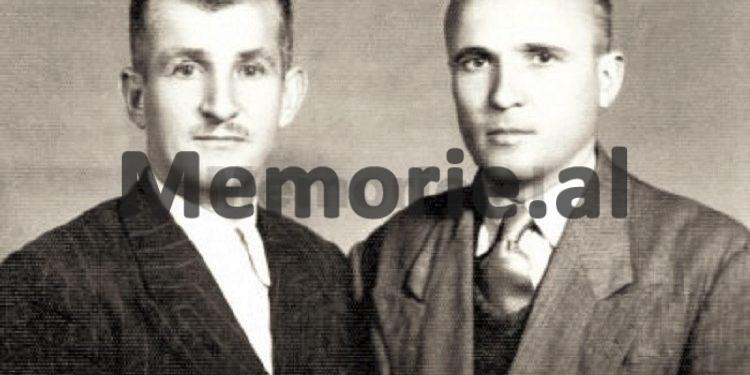
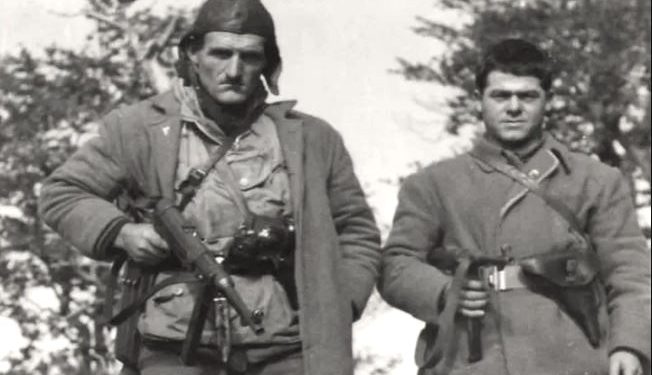
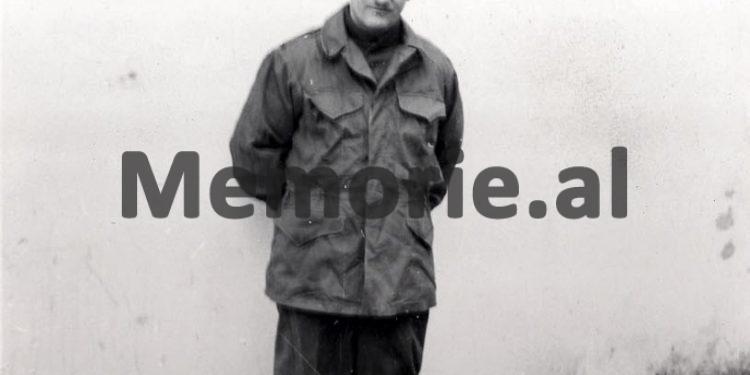
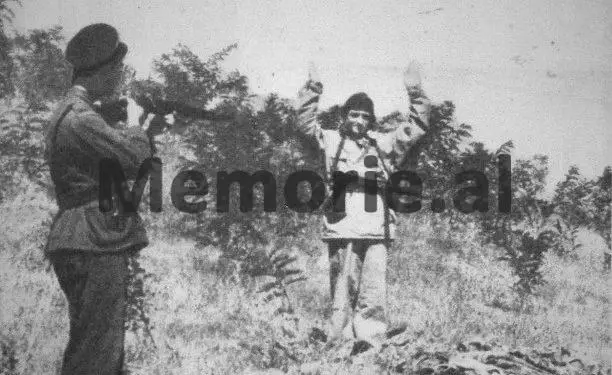
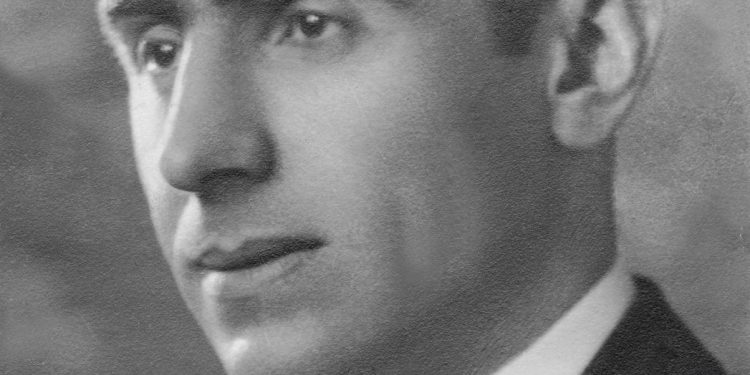
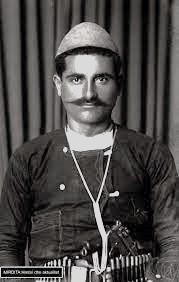
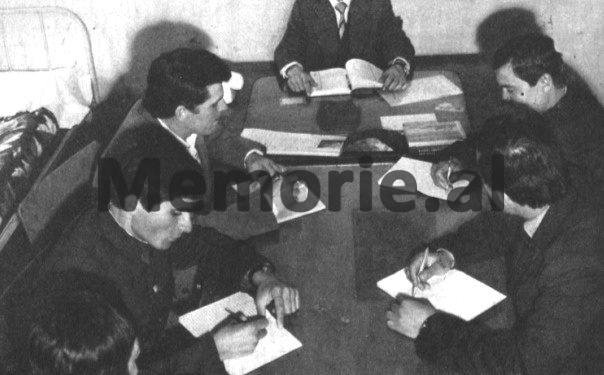
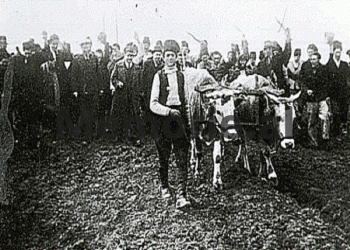
![“They have given her [the permission], but if possible, they should revoke it, as I believe it shouldn’t have been granted. I don’t know what she’s up to now…” / Enver Hoxha’s letter uncovered regarding a martyr’s mother seeking to visit Turkey.](https://memorie.al/wp-content/uploads/2026/01/Dok-1-350x250.jpg)

